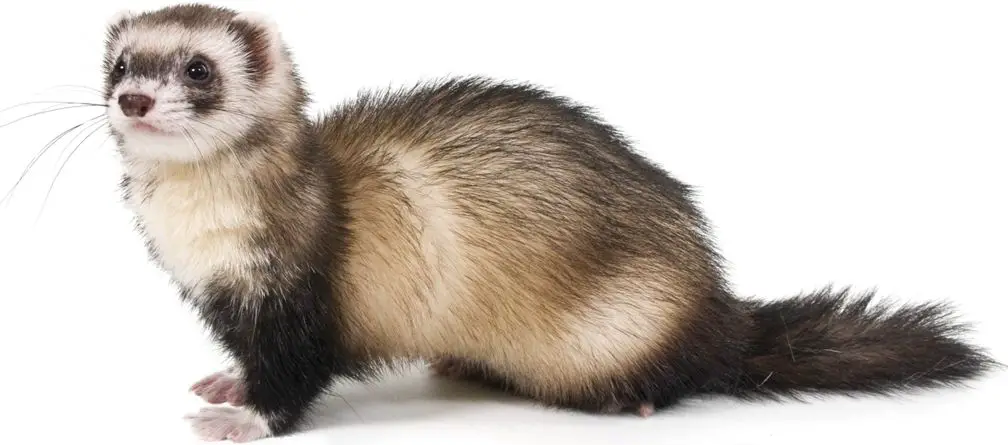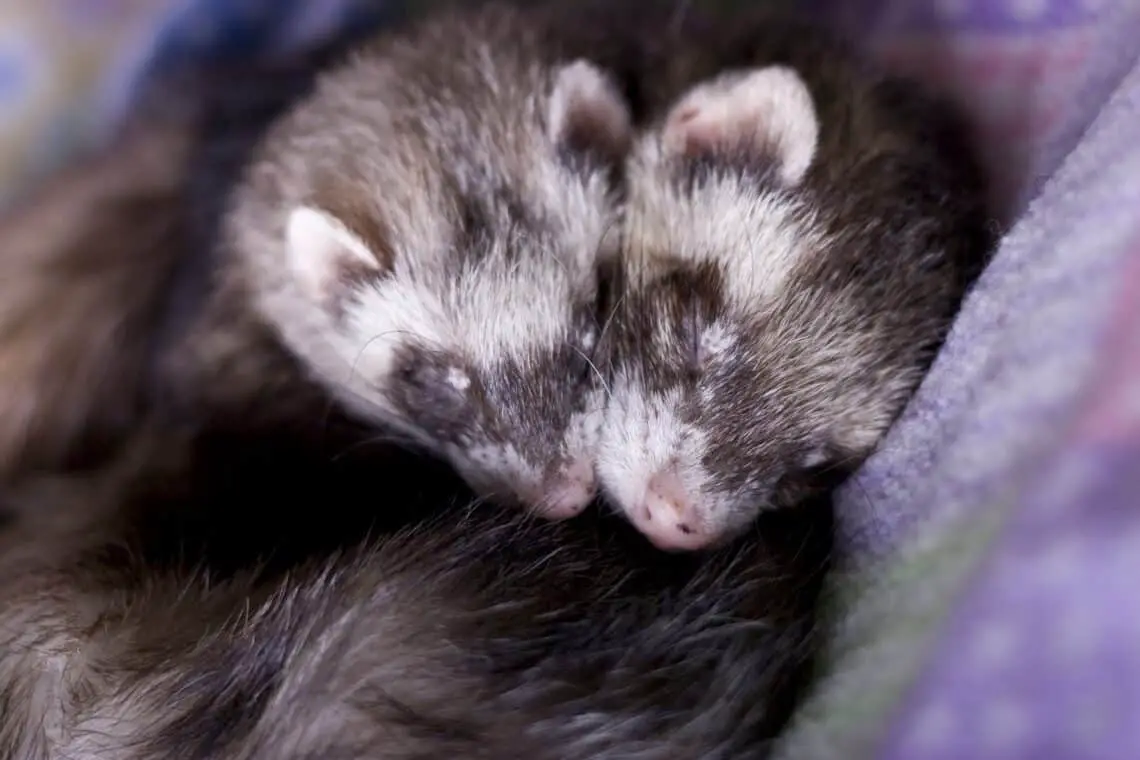Introduction
Are Ferrets Friendly: Ferrets, often described as playful and curious little creatures, have captivated the hearts of many animal enthusiasts around the world. But the question of whether ferrets are friendly is a topic of interest for both prospective pet owners and those simply curious about these fascinating animals. In this exploration, we will delve into the intriguing world of ferrets to uncover the nuances of their social nature, temperament, and interactions with humans and other pets. By the end of this discussion, you will gain valuable insights into the friendliness of ferrets home and discover what makes them such unique and endearing companions in the realm of domesticated animals.
Ferrets, scientifically known as Mustela putorius furo, are not only adorable and charming but also possess distinctive personalities that set them apart from other pets. Their reputation for friendliness is one of the key reasons they have gained popularity as household companions. However, like any animal, ferrets exhibit a range of behaviors and temperaments that can vary from one individual to another. This exploration will take you on a journey through the social dynamics of ferrets, their affinity for human interaction, and the factors that influence their friendliness. Whether you are considering bringing a ferret into your home or are simply intrigued by these small, inquisitive mammals, our journey into the world of ferret friendliness promises to be an enlightening one.
Beyond their cute appearance and intriguing personalities, ferrets have a long history of companionship with humans. These small carnivores were originally domesticated for hunting purposes, particularly to help control populations of pests like rabbits and rats. Over time, ferrets transitioned from working animals to beloved pets, thanks to their charming and affectionate nature. To understand the friendliness of ferrets, it’s essential to explore their behavior, social instincts, and how they interact with both humans and other animals. Ferrets are inherently social creatures, often thriving in the company of their human families. Their playful and mischievous antics can bring joy and laughter to any household.

Do ferrets bites hurt?
It’s worth noting that the ferret’s skin is thicker and tougher than human skin, so when ferrets nip at each other in play, they don’t inflict any real pain. But when they nip at a human, it can hurt.
Ferrets are naturally curious and playful animals. Biting is a part of their communication and exploration process. They may nip at objects, including fingers, to investigate their surroundings. Additionally, young ferrets often engage in rough play with their littermates, which can involve nipping and biting. As they mature, they typically learn bite inhibition, which means they learn to control the force of their bites.
Ferrets have sharp teeth, and their bites can be painful if they apply significant pressure. However, most well-socialized ferrets learn to control the force of their bites. Each ferret has its own personality, and some may be more prone to biting than others. Additionally, a ferret’s past experiences and socialization can influence its biting tendencies. If a ferret is in pain, stressed, or feels threatened, it may bite more forcefully. Sick or injured ferrets may also bite out of fear or discomfort.
Properly socialize your ferret from a young age to minimize biting behavior. Handle them gently and frequently to build trust and teach bite inhibition. Use positive reinforcement techniques to discourage biting. Reward your ferret for gentle behavior and provide appropriate toys for chewing and exploration. Regular veterinary check-ups can help detect and address any underlying health issues that may contribute to aggressive behavior. Be cautious when handling a ferret, especially if it’s agitated, scared, or not used to being held. Pay attention to their body language and avoid actions that might provoke a bite.
Do ferrets like to be held?
Ferrets really enjoy spending time with their human companions are usually happy to be picked up and cuddled. If they’re frightened or accidentally hurt, ferrets can give a strong bite. Getting them used to being picked up when they’re young is really important.
Ferrets, with their playful and curious nature, are often regarded as affectionate and social animals. While they may not necessarily enjoy being held in the same way that some other pets do, many ferrets can become accustomed to and even enjoy human handling if introduced and socialized properly. Here’s a closer look at how ferrets react to being held and tips for creating a positive experience for both you and your furry friend.
Just like people, ferrets have distinct personalities. Some may readily accept being held and cuddled, while others may be more reserved and less comfortable with it. It’s important to respect your ferret’s temperament and boundaries. Early and consistent socialization is key to helping ferrets become comfortable with human handling. When you first bring a ferret into your home, spend time gently handling and interacting with them. This helps build trust and familiarity.
Remember that trust and a strong bond take time to develop. Be patient and consistent in your interactions with your ferret. Spend quality playtime with them outside of holding sessions to build a positive overall relationship.
Do ferrets like to cuddle?
Ferrets may be tiny, but they pack big personalities into small packages. These guys can be extremely loving and cuddly with their humans. Of course, it takes time to form that special friendship.
Ferrets, with their playful and curious personalities, are not typically known for being cuddly pets in the same way that some other animals, like dogs or cats, are known to be. However, it’s important to understand that ferrets do have their own unique ways of showing affection and enjoying close interaction with their human caregivers.
Like humans, ferrets have individual personalities. Some ferrets may enjoy cuddling and seek out physical contact, while others may be more independent and less inclined to snuggle. The extent to which a ferret enjoys cuddling can vary widely from one individual to another. Ferrets have their own ways of showing affection. They may “dance” around you, give gentle nips (known as “love bites”), or follow you around as a sign of their attachment. These behaviors can be their way of expressing fondness without necessarily seeking cuddles.
Always respect your ferret’s boundaries. If they do not want to cuddle or be held at a particular moment, don’t force it. Forcing physical contact can cause stress and discomfort. When attempting to cuddle, approach your ferret calmly and gently. Speak softly and avoid sudden movements. Create a comfortable and safe environment for cuddling. Ensure the room is quiet and free from distractions to help your ferret feel secure.
Do pet ferrets smell bad?
Ferrets have a natural, normal smell but that doesn’t mean they should stink. Ferrets are popular pets, but many people note that they have a distinct odor to them. This musky smell is something that most ferret owners get used to and eventually don’t even notice, but sometimes the stink is worse than it should be.
Ferrets, like all animals, have a natural scent. They possess scent glands located near their anus and on the skin, which secrete oils with a distinct musky odor. This odor serves several purposes in the wild, including territorial marking and communication. It’s important to understand that this musky scent is a natural part of a ferret’s biology, and it cannot be entirely eliminated.
A ferret’s diet can significantly affect its odor. High-quality commercial ferret food is formulated to reduce odor compared to lower-quality diets. Some ferret owners also choose to feed their pets a raw or homemade diet, which can impact the scent.
Proper cage cleaning and litter box maintenance are crucial to managing ferret odor. Regular cleaning of their living space and litter boxes can help minimize odor buildup.
While it’s not recommended to bathe ferrets too frequently (as it can strip their skin of natural oils), occasional baths with ferret-specific shampoos can help reduce odor temporarily. Over-bathing can actually make the musky odor worse, as the ferret’s body may produce more oils to compensate.
Do ferrets harm humans?
Ferrets can also be carriers of ringworm fungus, fleas and scabies mites that can infect their handlers. Because of their inquisitive nature, ferrets can occasionally bite people, especially children who make sudden moves.
Like many small animals, ferrets have sharp teeth, and they may bite if they feel threatened, cornered, or in pain. However, ferret bites are usually not severe and rarely cause serious harm when compared to bites from larger animals. Proper training, socialization, and handling can help reduce the risk of bites.
Ferrets have sharp claws that they use for digging and climbing. While their claws are not typically as sharp as those of some other small animals (such as certain rodents), they can scratch if they are not accustomed to being handled or if they feel uncomfortable.
Some individuals may be allergic to ferret dander, which can cause allergic reactions similar to those triggered by other pets like cats or dogs. Allergic reactions can range from mild sneezing and itching to more severe symptoms in sensitive individuals.
Ferrets, like many animals, can carry zoonotic diseases that can potentially be transmitted to humans. This risk is relatively low, especially when ferrets receive regular veterinary care, vaccinations, and are kept in a clean and healthy environment. Practicing good hygiene, such as handwashing after handling a ferret, can further reduce this risk.
What do ferrets eat?
Ferrets are strict carnivores. In the wild they prey upon and eat whole animals that consist of raw meat, raw bones, other tissue and digested vegetable matter. They require a diet of meat/animal products that are typically high in protein and fat and low in carbohydrates and fibre.
The easiest way to meet your ferret’s dietary needs is by feeding them high-quality, commercially prepared ferret food. Look for brands that are specially formulated for ferrets as they provide the necessary nutrients.
Ferret kibble is available in both dry and semi-moist forms. Dry kibble is often preferred for dental health, but some ferrets may prefer semi-moist options.
Check Ingredients: Read labels carefully to ensure the food contains a high percentage of meat-based protein (at least 30-40%). Avoid foods with excessive carbohydrates, fillers, and sugars, which can be harmful to ferrets.
Some ferret owners choose to feed their pets a raw meat diet, also known as a raw prey model diet. This diet typically consists of whole prey animals or a mix of raw meats like chicken, turkey, and rabbit.
What are ferrets scared of?
Ferrets are fearless.
Ferrets, to their benefit or detriment, are not afraid of anything! This makes them great friends for cats, dogs, and other ferrets. It also makes them dangerously curious – so be sure you ferret-proof your home before playtime!
Ferrets have sensitive hearing, and sudden loud noises, such as thunderstorms, fireworks, or loud household appliances, can startle and stress them. Provide a quiet and secure space during noisy events to help them feel safe.
Ferrets are small and vulnerable, so they may be frightened by larger animals, especially dogs or other potential predators. Always supervise interactions between ferrets and other pets and ensure that they are introduced gradually and carefully.
Ferrets are delicate creatures, and rough or improper handling can be frightening and potentially harmful to them. Children and unfamiliar individuals should be taught how to handle ferrets gently and respectfully.
Ferrets are known for forming strong bonds with their human caregivers, and they can be cautious around strangers. Visitors or new people in the household may cause stress for your ferret. Provide a quiet and secure place for them to retreat to when new people are around.
Can I sleep with my ferret?
There isn’t a right answer to this question because it depends on the owner. You can let your ferret sleep with you on the bed. It is extremely adorable to snuggle your little fuzzy the entire night, but I wouldn’t recommend that. I am a little paranoid I will hurt my ferrets when I roll in the bed and squeeze them.
Some individuals may be allergic to ferret dander, saliva, or urine. If you have allergies, sleeping with your ferret may exacerbate your symptoms, leading to discomfort and potential health issues.
Ferrets are small and fragile animals. While they are generally friendly, they may move around or burrow under blankets during the night, increasing the risk of accidental injury.
Ferrets have scent glands that produce a natural musky odor, which can transfer to your bedding and sleeping area. This odor may be more noticeable in close quarters, potentially affecting your sleep quality.
Ferrets are crepuscular animals, meaning they are most active during dawn and dusk. Their sleep patterns may not align with yours, and they may wake you during the night with their playful antics.

Conclusion
These small, inquisitive mammals have charmed their way into the hearts of many as delightful and affectionate pets. Their inherently social nature, playful demeanor, and strong bonds with their human companions make them wonderful additions to the household. However, ferret friendliness is not guaranteed and requires proper care, training, and socialization. Owners should be prepared to invest time and effort into nurturing these relationships, as individual temperaments can vary. It’s also essential to provide them with a safe and stimulating environment, as well as regular veterinary care, to ensure their well-being. Ultimately, the friendliness of ferrets is a testament to the rewarding experiences they offer to those willing to invest in their care and companionship.
With the right approach and understanding of their needs, ferrets can become loyal and affectionate members of the family, bringing joy and laughter to their human counterparts. In the world of pet ownership, ferrets pets stand out as unique and endearing companions. Their friendly and sociable nature, combined with their playful antics, creates a bond that many ferret owners cherish. While ferret friendliness requires effort, the rewards are significant. Ferrets teach us about patience, commitment, and the power of forming meaningful connections with animals. They demonstrate that, with love and care, even creatures with different instincts and behaviors can become cherished friends.
The journey of nurturing a friendly ferret is not only rewarding but also a testament to the positive impact animals can have on our lives. In the end, whether you’re a dedicated ferret owner or someone considering welcoming a ferret into your home, understanding their friendliness is just the beginning. The journey of sharing your life with these captivating creatures is an ongoing adventure filled with love, laughter, and the joy of companionship. In the realm of pet ownership, ferrets hold a unique place as charming and affectionate companions. Their friendliness is a quality that sets them apart, and it’s a characteristic that can truly enrich the lives of those who choose to care for them.





No Comments